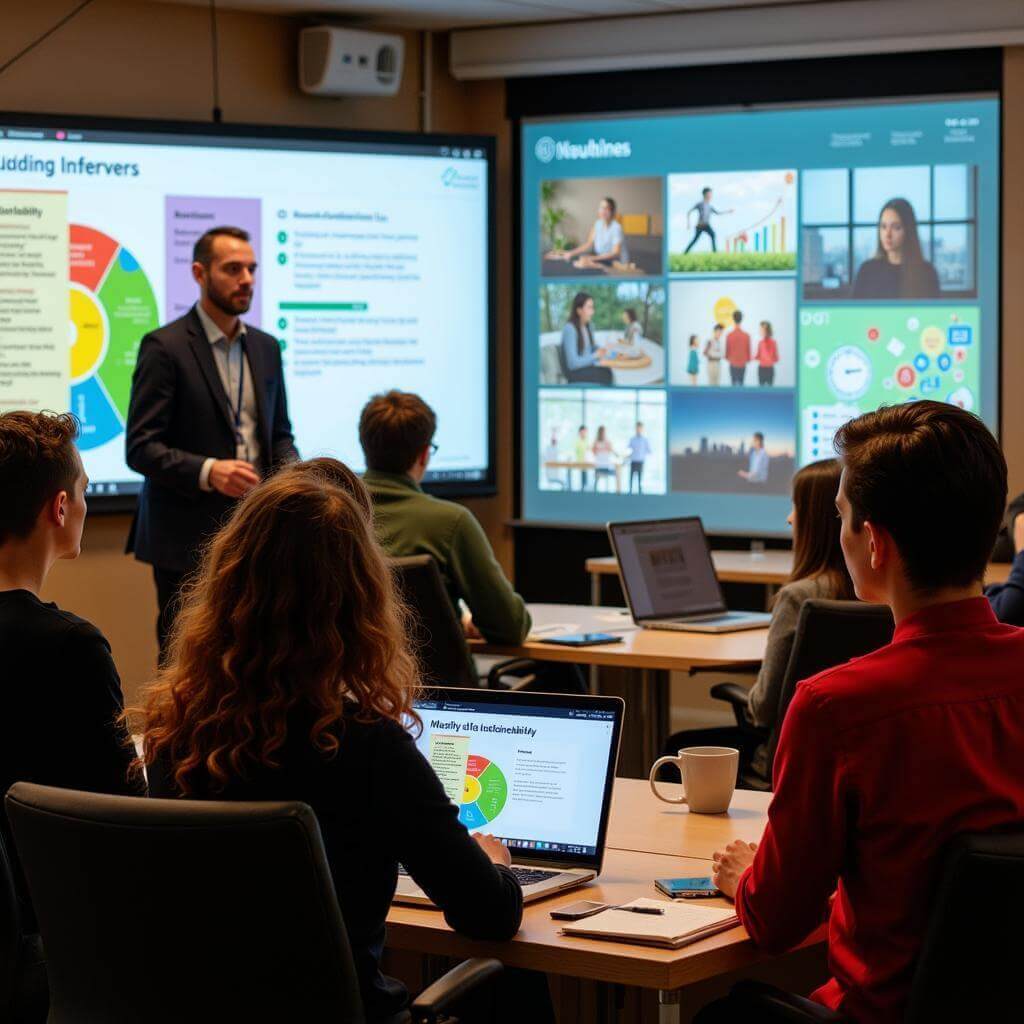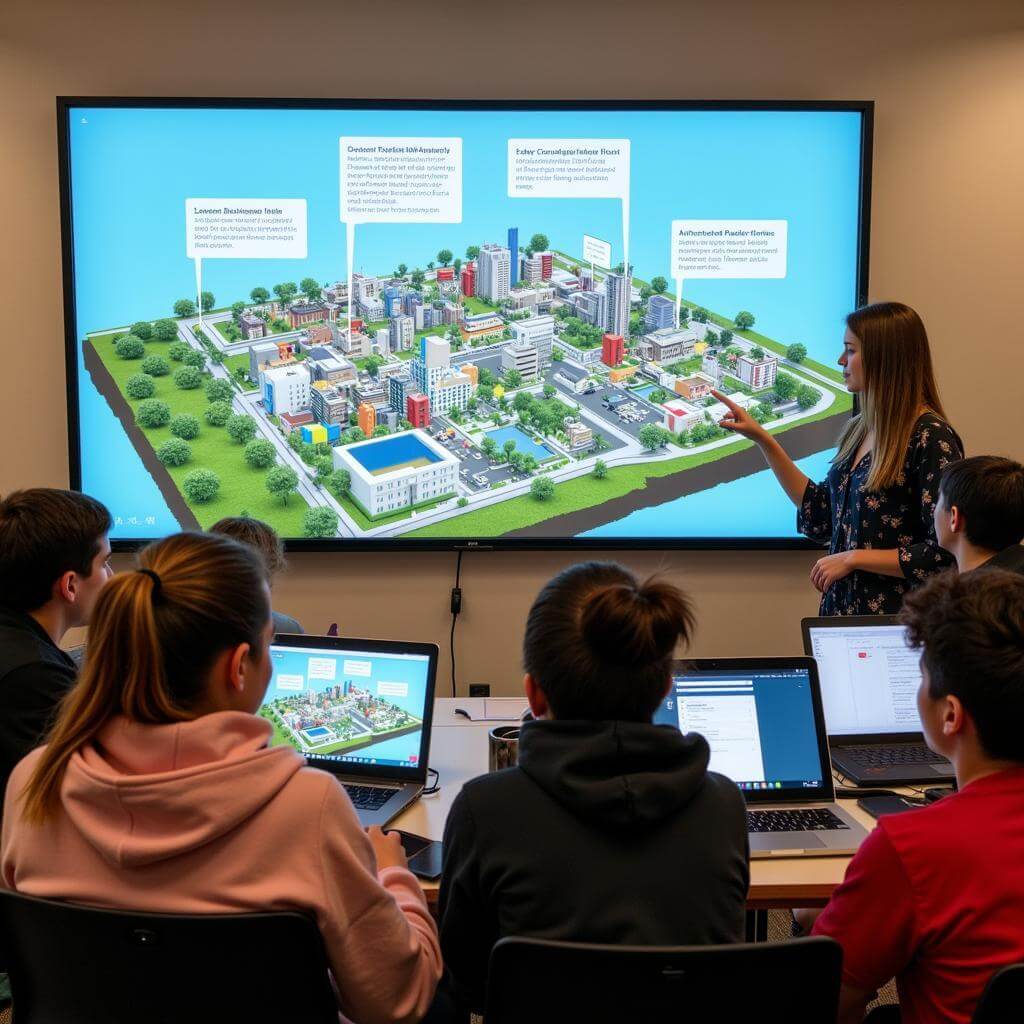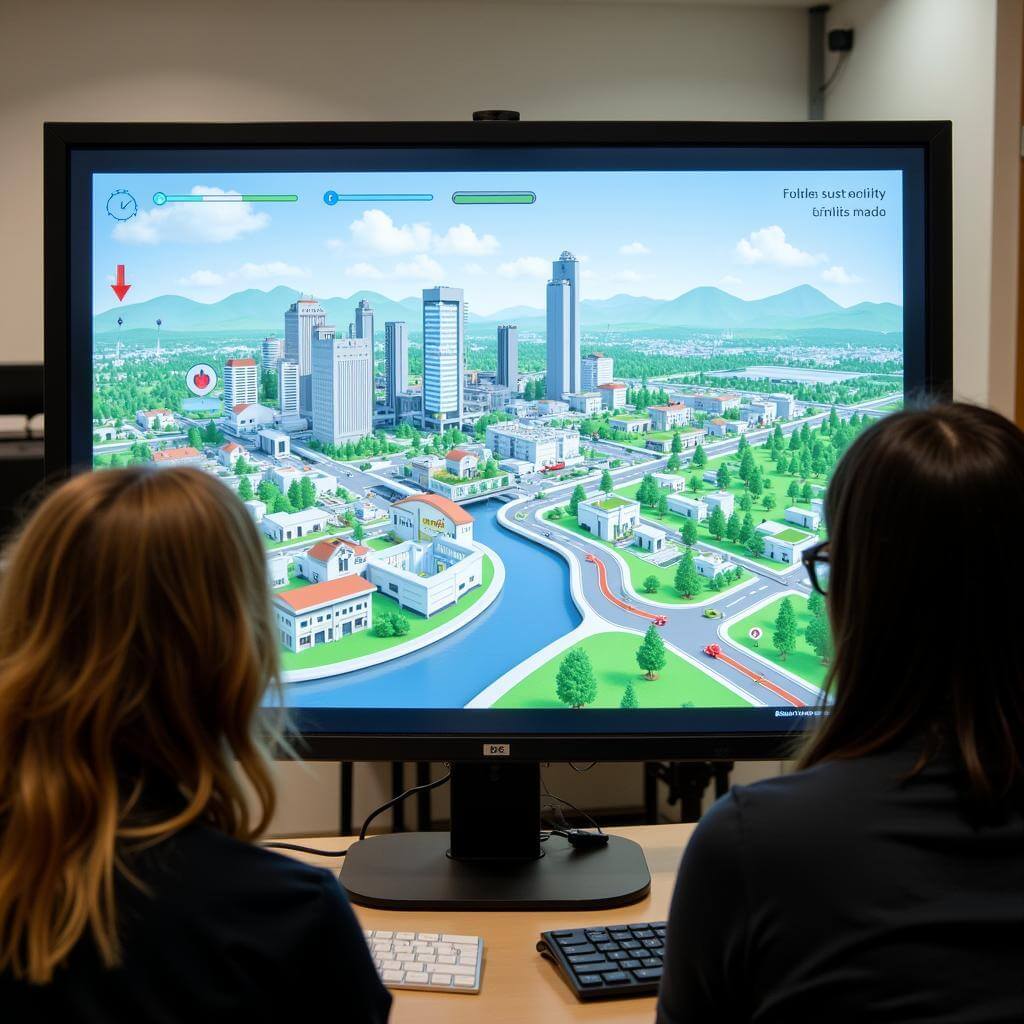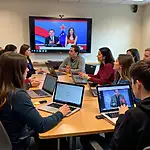The IELTS Reading test can be challenging, especially when it comes to topics like digital workshops on sustainable practices. As an experienced IELTS instructor, I’ve prepared a comprehensive practice test to help you improve your skills in this area. Let’s dive into a full IELTS Reading test focused on this theme.
Passage 1 – Easy Text
The Rise of Digital Workshops for Sustainability
In recent years, there has been a significant increase in the number of digital workshops focused on sustainable practices. These online sessions are designed to educate and empower individuals and organizations to adopt more environmentally friendly approaches in their daily lives and business operations. The convenience and accessibility of these digital platforms have made it possible for people from all over the world to participate in and benefit from these workshops.
How to build a sustainable career is a common topic explored in these digital workshops. Participants learn about green jobs, sustainable business models, and ways to incorporate eco-friendly practices into their existing careers. This knowledge is crucial for those looking to align their professional lives with their environmental values.
Digital workshops on sustainable practices cover a wide range of topics, from renewable energy and waste reduction to sustainable agriculture and eco-friendly transportation. Many of these workshops are led by experts in their respective fields, providing participants with up-to-date information and practical strategies for implementing sustainable practices.
One of the key advantages of these digital workshops is their interactive nature. Participants can engage in real-time discussions, ask questions, and even collaborate on projects with others from around the globe. This level of interaction fosters a sense of community and shared purpose among attendees, which can be highly motivating.
Moreover, these workshops often incorporate case studies and success stories from individuals and organizations that have successfully implemented sustainable practices. These real-world examples serve as inspiration and provide valuable insights into the challenges and benefits of adopting more environmentally friendly approaches.
 Interactive digital workshop on sustainable practices
Interactive digital workshop on sustainable practices
Questions 1-5
Do the following statements agree with the information given in the passage? Write
TRUE if the statement agrees with the information
FALSE if the statement contradicts the information
NOT GIVEN if there is no information on this
- Digital workshops on sustainable practices are only available to environmental professionals.
- These workshops cover topics such as renewable energy and waste reduction.
- Experts in various fields often lead these digital workshops.
- Participants in these workshops cannot interact with each other during the sessions.
- The workshops always include field trips to sustainable businesses.
Questions 6-10
Complete the sentences below. Choose NO MORE THAN TWO WORDS from the passage for each answer.
- Digital workshops on sustainable practices aim to educate and ____ individuals and organizations.
- These workshops provide information on how to build a(n) ____ career.
- The ____ nature of these workshops allows for real-time discussions and collaboration.
- ____ and success stories are often used to inspire participants.
- These digital platforms make it possible for people from ____ to participate in the workshops.
Passage 2 – Medium Text
Transforming Education Through Digital Sustainability Workshops
The integration of digital workshops on sustainable practices into educational curricula is revolutionizing the way students learn about and engage with environmental issues. These innovative learning experiences are not only enhancing students’ understanding of sustainability but also equipping them with practical skills to address global challenges.
Universities and colleges worldwide are increasingly incorporating these digital workshops into their programs, recognizing the importance of preparing students for a future where sustainability will be a critical concern. These workshops often employ a multidisciplinary approach, combining elements of environmental science, technology, economics, and social studies to provide a comprehensive understanding of sustainable practices.
One of the key benefits of these digital workshops is their ability to simulate real-world scenarios. Through virtual simulations and interactive models, students can experiment with different sustainable solutions and observe their potential impacts. This hands-on approach fosters critical thinking and problem-solving skills, which are essential for tackling complex environmental issues.
How global challenges are addressed through student projects is a crucial aspect of these digital workshops. Students are often tasked with developing sustainable solutions for real-world problems, collaborating with peers from different disciplines and even different countries. This global perspective is invaluable in preparing students for the interconnected nature of environmental challenges.
Moreover, these workshops frequently feature guest lectures from industry experts and environmental leaders. These sessions provide students with insights into current trends, emerging technologies, and best practices in sustainable development. The opportunity to interact with professionals in the field can be incredibly inspiring and may even lead to internship or career opportunities.
The asynchronous nature of many of these digital workshops allows for greater flexibility, enabling students to balance their sustainability education with other academic commitments. This flexibility also makes it possible for working professionals to participate in continuing education programs focused on sustainable practices.
 Students collaborating on a virtual sustainability project
Students collaborating on a virtual sustainability project
Assessment in these workshops often takes the form of project-based learning, where students are evaluated on their ability to apply sustainable principles to real-world scenarios. This approach not only tests their knowledge but also their creativity and practical problem-solving skills.
The impact of these digital workshops extends beyond the classroom. Many students who participate in these programs go on to implement sustainable practices in their communities, start eco-friendly businesses, or pursue careers in environmental fields. This ripple effect contributes to a broader societal shift towards sustainability.
As technology continues to advance, the potential for these digital workshops to create immersive and impactful learning experiences will only grow. Virtual reality and augmented reality technologies, for example, could soon allow students to ‘visit’ sustainable projects around the world or visualize the long-term effects of different environmental policies.
How to build a sustainable community is another important topic often covered in these workshops. Students learn about urban planning, community engagement, and local policy-making, all through the lens of sustainability. This knowledge empowers them to become active participants in shaping the future of their own communities.
Questions 11-16
Choose the correct letter, A, B, C, or D.
-
According to the passage, digital workshops on sustainable practices are:
A) Only available at a few select universities
B) Replacing traditional environmental science courses
C) Being integrated into educational curricula worldwide
D) Primarily focused on technology and economics -
The multidisciplinary approach of these workshops includes:
A) Environmental science and technology only
B) Economics and social studies only
C) A combination of various relevant disciplines
D) Exclusively practical skills training -
Virtual simulations in these workshops allow students to:
A) Play environmental-themed video games
B) Experiment with sustainable solutions
C) Watch pre-recorded lectures
D) Take virtual field trips -
The asynchronous nature of many digital workshops:
A) Requires all students to be online at the same time
B) Limits participation to full-time students
C) Allows for greater flexibility in learning
D) Reduces the quality of education provided -
Assessment in these workshops often involves:
A) Traditional written exams
B) Oral presentations only
C) Project-based learning
D) Peer evaluations exclusively -
The passage suggests that the impact of these workshops:
A) Is limited to the academic environment
B) Extends beyond the classroom into communities
C) Is only significant for environmental science majors
D) Has been overstated by educational institutions
Questions 17-20
Complete the summary below. Choose NO MORE THAN TWO WORDS from the passage for each answer.
Digital workshops on sustainable practices are transforming education by providing students with practical skills to address 17) ____ challenges. These workshops often use 18) ____ to simulate real-world scenarios, allowing students to experiment with different solutions. Guest lectures from 19) ____ provide valuable insights into current trends and best practices. The workshops’ impact extends beyond academia, with many participants going on to implement sustainable practices in their 20) ____ or start eco-friendly businesses.
Passage 3 – Hard Text
The Paradigm Shift: Digital Workshops Redefining Sustainable Business Practices
The advent of digital workshops focusing on sustainable practices has catalyzed a profound transformation in the corporate landscape, ushering in a new era of environmentally conscious business strategies. These virtual platforms have become instrumental in disseminating knowledge, fostering innovation, and facilitating the implementation of sustainable practices across various industries. The convergence of digital technology and sustainability education has created a powerful synergy that is reshaping the very foundations of modern business operations.
One of the most significant impacts of these digital workshops has been the democratization of sustainability knowledge. Previously, access to cutting-edge sustainable practices was often limited to large corporations with substantial resources. However, the proliferation of online workshops has leveled the playing field, enabling small and medium-sized enterprises (SMEs) to access the same information and expertise. This democratization has led to a more inclusive approach to sustainability, where businesses of all sizes can contribute to and benefit from environmentally friendly practices.
The pedagogical approach employed in these digital workshops is notably different from traditional business education. Instead of focusing solely on profit maximization, these programs emphasize the triple bottom line – People, Planet, and Profit. This holistic perspective encourages businesses to consider their environmental and social impact alongside their financial performance. Workshop participants are often challenged to reimagine their business models through this lens, leading to innovative solutions that balance economic viability with ecological responsibility.
The rise of cultural immersion experiences in education has also influenced the content and delivery of these digital workshops. Many programs now incorporate case studies from diverse cultural contexts, highlighting how sustainable practices can be adapted to different societal norms and economic conditions. This cross-cultural approach not only broadens participants’ perspectives but also prepares them for the challenges of implementing sustainable practices in a globalized business environment.
One of the most compelling aspects of these digital workshops is their ability to facilitate real-time collaboration among participants from different geographical locations and industry sectors. This cross-pollination of ideas often leads to unexpected innovations and partnerships. For instance, a manufacturer in Asia might collaborate with a logistics company in Europe to develop a more sustainable supply chain solution, all facilitated through a digital workshop platform.
The gamification of learning has emerged as a powerful tool in these workshops. Interactive simulations and scenario-based exercises allow participants to experiment with different sustainable strategies in a risk-free environment. These gamified elements not only enhance engagement but also provide valuable insights into the potential outcomes of various sustainability initiatives. Participants can witness the long-term impacts of their decisions, reinforcing the importance of sustainable thinking in business strategy.
 Interactive sustainability simulation in a digital workshop
Interactive sustainability simulation in a digital workshop
Moreover, these workshops often employ data analytics and artificial intelligence to provide personalized learning experiences. By analyzing participants’ interactions, preferences, and performance, these platforms can tailor content and recommendations to individual needs. This adaptive learning approach ensures that each participant, regardless of their prior knowledge or industry background, can derive maximum value from the workshop.
The impact of these digital workshops extends far beyond the duration of the program itself. Many platforms offer ongoing support and resources, creating a community of practice where participants can continue to share insights, challenges, and successes in implementing sustainable practices. This continuous learning model is crucial in a field as dynamic as sustainability, where new technologies and strategies are constantly emerging.
How cultural heritage shapes architectural education is another important aspect that these workshops are beginning to address. The intersection of cultural preservation and sustainable development presents unique challenges and opportunities. Digital workshops are increasingly incorporating modules on how to integrate sustainable practices with cultural heritage conservation, particularly in urban planning and architecture.
The efficacy of these digital workshops in driving sustainable business practices is evidenced by the tangible outcomes reported by participants. Many companies have successfully implemented waste reduction strategies, transitioned to renewable energy sources, or redesigned their products for greater sustainability – all inspired by insights gained from these workshops. Furthermore, some organizations have reported significant cost savings and improved brand reputation as a result of their sustainability initiatives, challenging the notion that environmental responsibility necessarily comes at the expense of profitability.
As these digital workshops continue to evolve, they are likely to play an increasingly central role in shaping the future of sustainable business practices. The integration of emerging technologies such as virtual reality and blockchain could further enhance the immersive and transformative potential of these learning experiences. Moreover, as sustainability becomes an increasingly critical factor in consumer choices and regulatory frameworks, the demand for such educational platforms is expected to grow exponentially.
In conclusion, digital workshops on sustainable practices represent a paradigm shift in how businesses approach environmental responsibility. By leveraging technology to democratize knowledge, foster collaboration, and simulate real-world scenarios, these platforms are equipping business leaders with the tools and insights needed to navigate the complex challenges of sustainable development. As we move towards a future where sustainability is not just an option but a necessity, the role of these digital workshops in shaping responsible business practices cannot be overstated.
Questions 21-26
Complete the sentences below. Choose NO MORE THAN TWO WORDS from the passage for each answer.
- Digital workshops have led to a ____ of sustainability knowledge, making it accessible to businesses of all sizes.
- The workshops emphasize the ____, which includes People, Planet, and Profit.
- The incorporation of case studies from diverse cultural contexts prepares participants for challenges in a ____ business environment.
- ____ of learning is used in these workshops to enhance engagement and provide insights into sustainability initiatives.
- The workshops often use ____ and artificial intelligence to provide personalized learning experiences.
- Many platforms offer ongoing support, creating a ____ where participants can continue to share insights.
Questions 27-32
Do the following statements agree with the claims of the writer in the passage? Write
YES if the statement agrees with the claims of the writer
NO if the statement contradicts the claims of the writer
NOT GIVEN if it is impossible to say what the writer thinks about this
- Digital workshops on sustainable practices are only effective for large corporations.
- The pedagogical approach in these workshops focuses solely on profit maximization.
- Real-time collaboration in digital workshops can lead to unexpected innovations and partnerships.
- Gamified elements in the workshops are primarily used for entertainment purposes.
- Companies have reported cost savings and improved brand reputation as a result of implementing insights from these workshops.
- The demand for digital sustainability workshops is expected to decrease in the future.
Questions 33-36
Choose the correct letter, A, B, C, or D.
-
According to the passage, the impact of digital workshops on sustainable practices:
A) Is limited to the duration of the program
B) Extends beyond the workshop through ongoing support and communities of practice
C) Is difficult to measure in real-world business scenarios
D) Only affects large corporations with substantial resources -
The integration of cultural heritage in sustainability workshops is important because:
A) It presents unique challenges in urban planning and architecture
B) It is a mandatory requirement for all businesses
C) It only applies to companies in the tourism sector
D) It has no relevance to sustainable business practices -
The passage suggests that the future of digital sustainability workshops may include:
A) A decrease in the use of technology
B) A focus on profit maximization strategies
C) The integration of virtual reality and blockchain technologies
D) A return to traditional classroom-based learning -
The main argument of the passage is that digital workshops on sustainable practices:
A) Are a passing trend in business education
B) Only benefit a small number of industries
C) Represent a fundamental shift in how businesses approach environmental responsibility
D) Are less effective than traditional sustainability training methods
Answer Key
Passage 1
- FALSE
- TRUE
- TRUE
- FALSE
- NOT GIVEN
- empower
- sustainable
- interactive
- Case studies
- all over the world
Passage 2
- C
- C
- B
- C
- C
- B
- global
- virtual simulations
- industry experts
- communities
Passage 3
- democratization
- triple bottom line
- globalized
- Gamification
- data analytics
- community of practice
- NO
- NO
- YES
- NO
- YES
- NO
- B
- A
- C
- C
By practicing with this comprehensive IELTS Reading test on digital workshops for sustainable practices, you’ll be better prepared to tackle similar topics in the actual exam. Remember to manage your time wisely and use the strategies we’ve discussed in our digital workshops. Good luck with your IELTS preparation!


